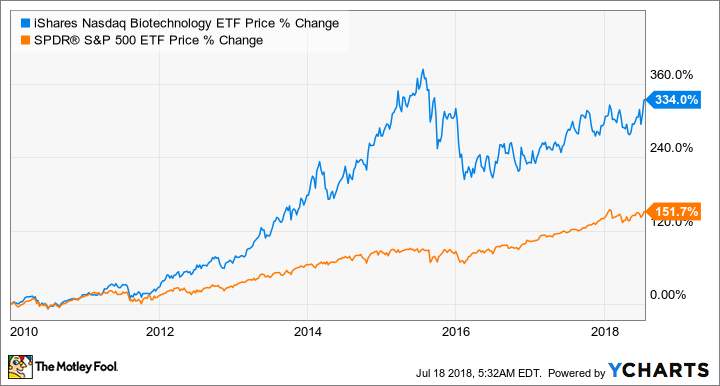The biopharmaceutical industry has been extremely generous toward investors over the last eight years. Since Jan. 1, 2010, for example, this high-flying industry has absolutely crushed the broader markets. The chart below outlining the performance of the iShares Nasdaq Biotechnology ETF vs. the SPDR S&P 500 ETF over this particular time period illustrates this point perfectly:
Not every biopharma stock has been a gushing success for investors, though. Pharma titan Pfizer (PFE -2.00%) and clinical-stage vaccine developer Novavax (NVAX -2.28%), for instance, have both drastically under-performed their pharma peers during this period.

Image source: Getty Images.
As both companies have been working toward changing this rather bleak situation, I think it's the perfect time to consider which of these chronic under-performers is better situated to break out of this funk moving forward. Let's dive in to find out.
Novavax: Value rich, cash poor
Wall Street believes Novavax's shares might be ridiculously undervalued. The Street's high-end price target on this stock, after all, implies a mind-blowing 614% upside potential. And even the far more modest consensus price target of $3.93 would entail a healthy 180% appreciation from current levels.
Why is Wall Street so optimistic about Novavax's prospects? The company is developing the most valuable vaccine in the industry with its combined respiratory syncytial virus (RSV) and flu candidate. Market research firm EvaluateGroup has this experimental vaccine potentially raking in a sky-high $2.65 billion in sales by 2024.
As you might suspect, though, this promising clinical-stage biotech also comes with a rather big catch. Namely, Novavax will need to issue shares to raise a significant amount of capital within perhaps the next three quarters -- that is, unless it can ink a favorable licensing deal soon.
In fact, I wouldn't be surprised if Novavax ended up rolling out a secondary offering of between $100 million to $200 million in the next six months to meet its near-term financial obligations. That's a major risk factor any potential investor needs to understand prior to buying shares right now.
The bottom line is that this biotech must secure enough funding to see it all the way through the upcoming interim analysis for its RSV vaccine candidate early next year, as well as a possible regulatory filing for this same vaccine in either late 2019 or early 2020. Therefore, investors need to weigh this stock's jaw-dropping upside potential against the very real possibility of taking a sizable hit in the form of dilution.
Pfizer: Where's the growth?
With a dividend yield of 3.66%, Pfizer has been a great income stock for investors for years at this point. However, the drugmaker has simply failed to impress on the growth front for a while now, causing its share price to lag behind those of many of its big pharma peers.
The trouble is that Pfizer has had numerous megablockbuster products lose exclusivity this decade, and this sea of patent losses has blunted the impact of newer growth products, like blood thinner Eliquis. Pfizer's top line is thus forecast to be one of the slowest growing among all big pharmas and blue-chip biotechs over the next six years.
Now, Pfizer's management has noted that the impact of legacy products on its growth profile should start to soften by as soon as 2020. The company, after all, is facing its last major loss of exclusivity with pain medication Lyrica later this year, and it also sports one of the deeper clinical pipelines in the industry right now.
That said, Pfizer is betting big on the nascent biosimilar market (copycats of biologically based drugs that have lost patent protection) to deliver a big chunk of its top-line growth going forward, and that risky strategy might backfire in a big way. Biosimilars, after all, have been exceedingly slow to take hold in the U.S. due both to a complex regulatory/legal environment and a chaotic reimbursement landscape that is still very much a work in progress.
Which stock is the better buy?
At the end of the day, I think Pfizer is the far better buy in this case because of its rich dividend yield and far less risky outlook. Novavax may have an enormous upside potential, but the company's financial, clinical, and regulatory risks could each spell disaster for investors. So even though Pfizer isn't projected to be a world beater in terms of capital appreciation going forward, this stock also shouldn't end up hurting your portfolio in the long run. The same simply can't be said for Novavax.






